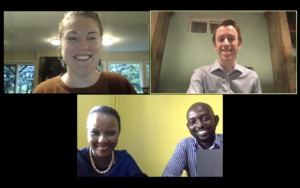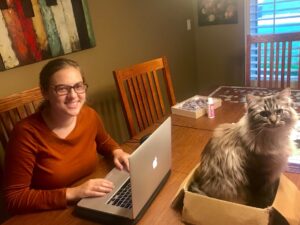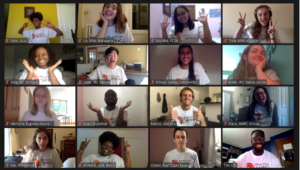September/October 2020
Dear Friends,
We hope that you and your loved ones are continuing to do well.
This past August we held our inaugural Virtual Orientation. Alumni from around the world joined the new Fellows to lead discussions related to responsible engagement on the continent, identity and decolonization, and work specific skills, among many other topics. In late August and early September, the 16 incredible members of the 2020-21 fellowship cohort started their fellowships. They are working with 11 organizations across 9 different countries providing remote support in areas such as monitoring & evaluation, fundraising, communications and finance. We are excited to also welcome three new organizations to the Princeton in Africa family – Foundation for Community Development and Empowerment (FCDE), International Livestock Research Institute (ILRI), and Kaz’O’zah Keza.
PiAf has now begun searching for our next class of Fellows. The 2021-22 application is currently live and will be due on October 28th. If you know of a young professional who would make a strong candidate, please encourage them to apply. Just in time for our 2021-22 cycle, PiAf is excited to welcome Amina Musa as the new Program Manager. Read more about the skills that she brings to the team here. PiAf is also planning a Winter Virtual Gathering for friends and supporters. Keep an eye out for more information to come.
Finally, members of our board have pledged a 1:1 match of up to $12,000 for all donations made before December 31st, 2020. Please help us meet this goal by donating here.
PiAf Connections
Please click below to check out pictures of our Fellows, Alums and other members of the PiAf family meeting up at home and around Africa.
Notes from the Field
By Conor Vance, '20-'21 Fellow with Kaz’O’zah Keza in Uganda/Burundi

Conor starts a day of work with a fresh cup of Burundian coffee.
Greetings from Princeton in Africa in New York City! As I write, I’ve recently begun a remote posting with Kaz’O’zah Keza, a non-profit organization that provides artisan skills training to under resourced and rural communities in Burundi. I’ve now completed three weeks in what is sure to be a challenging year for the 2020-21 cohort. Remote work creates the oddity of living several thousand miles from my colleagues, which is a particular test for me as the first Fellow at my host organization. Meanwhile, Kaz’O’zah itself has been challenged by the dual mandate of responding to the impacts of COVID-19 while continuing in its original mission. And globally, long-standing inequities in health care quality and accessibility have put the most vulnerable communities, including many with which Princeton in Africa partners, at the greatest risk.

A locally-made face mask, one of many produced daily by Kaz’O’zah artisans.
But while there is risk, the need for organizations like Kaz’O’zah is as great as ever. In ‘normal’ times, Kaz’O’zah facilitators train beneficiaries in making clothes, handbags, and jewelry. Now, with the pandemic and PPE shortage, they are producing masks and distributing them in Burundi. In recognition of our efforts, the World Bank country representative recently presented a gift of Kaz’O’zah face masks at a meeting with the Burundian president, a gesture for which we are honored. Kaz’O’zah is a proudly grassroots social enterprise in Burundi, addressing poverty and inequality by providing communities with the skills and support to achieve their full potential. In response to COVID, we have found ways to adapt our mission to the circumstances.

Conor attending online orientation for Kaz’O’zah Keza.
I’m lucky to have the opportunity to join Kaz’O’zah at a time when the organization is entering a new period of planning and long-term preparation, prompted by the current pandemic. In my role, I will be using data in new and meaningful ways to better showcase the positive impacts of Kaz’O’zah training and support. We’re also trying exciting new things on social media, where we aim to highlight our mission, our initiatives, and our value chain. You can find us on Instagram (@kaz.o.zah), Facebook, and LinkedIn!
My Princeton in Africa fellowship has been an incredibly exciting experience thus far, even with its remote status. As the year progresses, I look forward to engaging with everything that the upcoming year will bring!
Notes from the Field
By Trina Swanson, '20-'21 Fellow with Baylor Pediatrics AIDS Initiative in Eswatini

Trina sitting at her desk doing her remote work with her work buddy, Fitz the cat.
16 tiny squares on my screen—in the era of zoom, there isn’t anything special about 16 little boxes on a laptop, right? Wrong. After nearly five months of anxiety and uncertainty wrought by the pandemic, I found solace in the 16 squares of Fellows during our PiAf Virtual Orientation this past August.
It definitely wasn’t a “normal” orientation experience. But then again—nothing is really normal these days. For example, in our icebreaker activity “Fellows Bingo,” we did not walk around asking the other Fellows about their secret talents to fill out physical bingo boards. Instead, we Whatsapp’ed, Zoom direct messaged, and called them to type their names into a Google Doc. Lunches were in our own kitchen with our own food while we chatted on screen, and we had solo dance parties in our living rooms to “Wakanda Forever” and other gems from the playlist Resla shared during breaks. We were physically apart, but connected via screen.

16 squares of fun
For Fellows based out of California, orientation began in the wee hours of the morning. It ended in the middle of the night for Fellows based out of East Africa and India. But regardless of the time zone, digital orientation was a genuine space where we could come together to talk about our anxieties from the past couple months and our apprehensions for the beginning of our remote fellowships. And for every hour of orientation, there was a constant influx of amazing PiAf alumni floating into our screens, offering invaluable expertise and advise.
Since orientation, we’ve continued to have Fellow meet-ups on Saturdays via Zoom to encourage and support one another. I am so thankful for how they’ve challenged me to be continuously decolonizing my mind and approach to working on the continent, especially since I’m still (physically) in America. In the wake of the killing of George Floyd and a summer of reckoning with racial injustice in America and elsewhere, these challenges and conversations are more important than ever.
I have now started my role with Baylor International Pediatric AIDS Initiative in Eswatini as the Resource Mobilization Officer. I’m still a bit nervous about what the year will entail because this is the first time Baylor Eswatini has had an employee work entirely remotely. There are many logistical aspects that are revised and fine-tuned day by day. But even though we are an ocean apart, in early morning meetings, via Zoom and Whatsapp calls, I’ve been able to connect with my Swazi co-workers, and become even more impassioned in my role at this clinic which is the largest provider of pediatric HIV care in the country. Services like antiretroviral therapy cannot halt, especially during Covid-19, so neither must the funding that supports these services—which is where I come in. We’re all figuring this out together, but this is the future of our world, right? Let the (remote) work begin!










